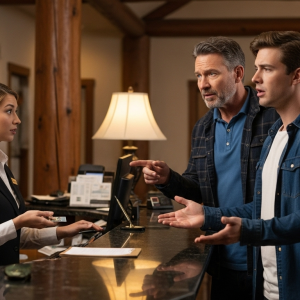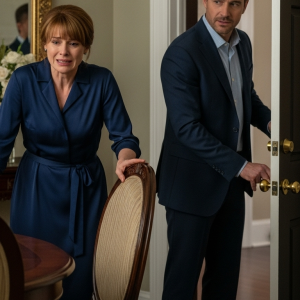The air in the reception hall was thick and heavy, smelling of wilting lilies and catered coffee. It was a sterile, oppressive scent that seemed to cling to the dark suits and black dresses of the mourners. Sarah felt like she was breathing underwater, each inhale a struggle against the crushing weight of grief.
She stood near a large bay window, watching the gray afternoon sky weep onto the perfectly manicured lawns of the funeral home. Her own eyes were dry. She had run out of tears hours ago, maybe even days ago, leaving behind a hollow ache in her chest where her heart used to be.
Her son, eight-year-old Leo, was a silent, warm presence at her side. He hadn’t spoken much since his father, David, had passed. He simply held onto his dad’s old phone, its screen dark, his thumb stroking the smooth glass as if it were a precious stone. It was a lifeline to a world that no longer existed.
Across the room, Margaret, her mother-in-law, was holding court. Dressed in the most immaculate, expensive black silk, she was the very picture of the grieving matriarch. She dabbed at her perfectly dry eyes with a delicate lace handkerchief, accepting condolences with a performance of tragic grace that made Sarah’s stomach churn.
To the world, Margaret was a pillar of strength, a mother mourning her only son. To Sarah, she was the architect of a quiet, unseen misery that had plagued her marriage for years. Her weapon wasn’t shouting or overt cruelty, but the slow, methodical drip of poison—a backhanded compliment, a loaded question, a story told to relatives that painted Sarah as incompetent, unworthy.
A few days before David’s heart finally gave out, he had called Leo into their bedroom. Sarah had watched from the doorway, a lump forming in her throat as she saw her husband, pale and frail against the pillows, speaking with a grave intensity to their son.
“Buddy, I need you to be a big man for me,” David had whispered, his voice raspy. He pressed his phone into Leo’s small hands. “I’ve made a video. The very last one. If… if Grandma Margaret is ever mean to Mommy after I’m gone… if she makes her sad… I need you to show it to everyone. Can you promise me that?”
Leo, his young face etched with a seriousness far beyond his years, had nodded solemnly. “I promise, Dad.” He had treated the phone as a sacred object ever since. Sarah hadn’t known the contents of the video, only that it was David’s final, desperate move in a chess game he had been losing for years.
Now, in the suffocating quiet of the reception, Sarah could feel Margaret’s gaze on her, as sharp and cold as a shard of ice. The performance was over. The true war was about to begin.
The crowd of mourners began to thin, the murmurs of sympathy softening to respectful whispers. Margaret, having completed her tour of the room, drifted towards a small group of close family members—aunts, uncles, and cousins who had known David his entire life. They surrounded her, offering her water and a place to sit.
Sarah remained by the window, feeling like an outsider at her own husband’s memorial. She just wanted to take Leo and go home, to curl up in David’s side of the bed and pretend this was all a nightmare. But she couldn’t. That would be seen as weakness, as disrespect, and Margaret would use it against her.
Margaret settled into a plush armchair, her back ramrod straight. She sighed, a long, theatrical sound that drew the attention of everyone nearby. Her eyes, cold and calculating, found Sarah’s across the room. She held the stare for a long moment before speaking.
Her voice wasn’t a shout. It was far more effective than that. It was a clear, carrying whisper, laced with venom and perfectly pitched to be heard by the dozen or so people closest to her.
“Well,” Margaret began, her lips curling into a semblance of a sad smile. “At least he found his peace before he had to live with the humiliation.”
The words hung in the air, instantly chilling the warm room. There was no ambiguity. Her gaze flickered pointedly toward Sarah, a silent, public accusation. The implication was as clear as it was cruel: Sarah was the humiliation. Sarah was the reason for his suffering. Sarah was the cause of his death.
A wave of nausea washed over Sarah. It was a physical blow, stealing the air from her lungs. The faces of the relatives around Margaret shifted from sympathy to awkward curiosity. Some looked at the floor, others exchanged uncomfortable glances. No one said a word. No one defended her.
In that deafening silence, Sarah felt herself shatter. Margaret had waited for the most vulnerable moment of her life to deliver the final, killing stroke. She had painted her as a monster on the very day she mourned the love of her life.
The silence stretched, thick and unbearable. Sarah stood frozen, pinned in place by the weight of a dozen pairs of eyes. The shame was a hot flush crawling up her neck, her hands trembling by her sides. She wanted to scream, to rage, to tell them all the truth about this venomous woman, but her throat was closed tight with unshed tears.
Just as she felt her knees might buckle, a small movement broke the spell.
Leo, who had been a statue by her side, slid off the high-backed chair he’d been perched on. He landed on the plush carpet with a soft thud. He didn’t look at his mother. He didn’t look at the sympathizing, judging faces of his relatives. His eyes were fixed on one person.
His grandmother.
Clutched in his small hand was his father’s phone. He held it not like a toy, but like a shield, or perhaps a weapon. His face, so often a mask of childish innocence, now held a terrifying, adult resolve. The grief was still there, but it was tempered with purpose.
He took a step forward, then another, his small shoes silent on the thick rug. He walked directly into the center of the room, into the space between his mother and Margaret, and stopped. The entire room held its breath.
“You’re lying,” Leo said.
His voice, though a child’s, was clear and steady. It cut through the suffocating tension like a knife. Margaret’s mask of sorrow faltered, replaced by a flash of genuine shock, then annoyance.
“Leo, darling, this is not the time,” she hissed, her voice a sharp whisper. “Go to your mother. The adults are talking.”
Leo didn’t flinch. He stood his ground, a small soldier fulfilling his final orders. He looked from his grandmother’s furious face to the curious expressions of the family members surrounding her.
“My dad told me you would do this,” he said, his voice growing stronger. “He told me you would try to make everyone think Mom was bad.” He lifted the phone. “He said… he said you were the one who made him sad.”
A nervous murmur rippled through the onlookers. Margaret’s face had paled, her composure finally cracking. “That’s enough, Leo! You don’t know what you’re saying. Grief is confusing you.” She started to rise from her chair, her intention clear: to take the phone, to silence him.
But Leo was faster. He had seen his father do it a hundred times. He swiped his thumb across the phone’s screen, tapped the cast icon, and selected the large smart TV mounted on the wall, which until now had been displaying a serene slideshow of David’s life.
“Grandma says Dad died of humiliation,” Leo announced, his voice ringing with a conviction that stunned the room into silence. “So, does everyone want to hear what my dad had to say about her humiliation?”
Before Margaret could lunge forward, the television screen flickered. The slideshow of smiling photos vanished, replaced by the live image of David.
He wasn’t smiling. He was propped up in his bed, looking tired, gaunt, and impossibly sad. But his eyes burned with a fierce, resolute light. He looked directly into the camera—directly at them. The room was utterly silent, save for the sound of David’s strained breathing from the TV’s speakers.
“Hello, everyone,” David’s voice filled the hall. “If you’re seeing this, it means I’m gone. And it probably means my mother is trying to rewrite history. As usual.”
He coughed, a weak, rattling sound. “Mom, I know you’re there. I know you’re probably telling everyone how Sarah broke my heart. How she was a disappointment. How she was the source of all my stress.”
He paused, taking a slow breath. Margaret was frozen in place, her face a mask of horror.
“But today, only the truth gets to be spoken. So let me tell you all about the secret my mother has been using to control and blackmail me my entire adult life.”
A collective gasp went through the room.
“You see, my mother, the picture of moral perfection, had an affair when I was a teenager,” David continued, his voice raw with pain. “She had a child. A son. My half-brother. She gave him away, paid his family to keep quiet, and erased him from her life. But the secret remained. Her secret.”
He looked away from the camera for a moment, his jaw tight with emotion. “Every time I stood up to her, every time I chose my wife, my family, over her suffocating control, she would threaten to tell my father. She would threaten to tear our family apart with her lie, and she would blame it on me. She used her own shame to poison my life, to poison my marriage.”
“She told me that if I ever exposed her,” David’s voice cracked, “it would have killed my father. After he passed, she told me it would dishonor his memory. She weaponized her sin against me. That was her power. That was the ‘humiliation’ I had to live with.”
He looked back into the camera, his eyes finding Sarah’s in the room as if he could see her. “Sarah, my love. I am so sorry. I was a coward. I should have fought harder. I’m doing it now. This video is my ‘dead man’s switch.’ It’s the only way I knew how to protect you and Leo when I was gone.”
He took one last, shuddering breath. “My last will and testament is with my lawyer. It leaves everything—every dollar, every stock, every brick of our home—to my wife, Sarah, and my son, Leo. My mother, Margaret, will not receive a single cent. She has taken enough from me in this life.”
The video ended. David’s face froze on the screen, a final, heartbreaking testament.
The silence that followed was a living entity. It was filled with the deafening sound of a life’s worth of lies being exposed. Every eye in the room turned from the ghost on the screen to the woman in the armchair.
Margaret didn’t scream or protest. She couldn’t. The proof was absolute, delivered by the son she claimed to adore. The perfect, porcelain mask of the grieving matriarch didn’t just crack; it disintegrated, turning to dust.
She made a small, choking sound, like a strangled gasp for air. The color drained from her face, leaving behind a waxy, sallow pallor. Her carefully constructed world, built on a foundation of deceit and manipulation, had been demolished in under three minutes by the son she had tried to control even in death.
She visibly sagged in her chair, a puppet whose strings had been cut. The relatives who had been flocking around her, offering tissues and whispered comforts, now recoiled. They took a step back, then another, their expressions shifting from pity to shock, and then to a cold, rising disgust. They were looking at a stranger.
An elderly uncle, David’s father’s brother, who had always been quiet and reserved, stared at Margaret with eyes full of dawning horror, as if finally understanding decades of unspoken family tension. He slowly shook his head and turned away, the silent judgment more damning than any shout.
The destruction was not loud or violent. It was a quiet, complete, and irreversible unraveling. In the space of a single video, Margaret had lost everything: her credibility, her moral authority, her son’s memory, and the respect of her entire family. She was utterly and completely alone, shipwrecked in the ruins of her own lies.
Sarah finally took a breath. It felt like the first true breath she had taken in years. The weight that had been pressing down on her, the invisible burden of Margaret’s disapproval and David’s pained silence, simply evaporated. It was replaced by a profound, cleansing sorrow—not for what was lost, but for what could have been.
Leo came to her side and slipped his small hand into hers. He looked up at her, his eyes asking a simple question: Did I do okay?
She knelt down and pulled him into a fierce embrace, burying her face in his hair. “You were so brave,” she whispered, her voice finally breaking. “You were so, so brave. Dad would be so proud of you.” He wasn’t just a boy anymore; he was his father’s final act of love, the executor of justice.
Slowly, the spell that had held the room captive broke. People began to move, to talk in hushed tones, carefully avoiding looking at the broken woman in the chair. One of David’s cousins, a woman who had always been polite but distant to Sarah, walked over and placed a tentative hand on her shoulder.
“Sarah,” she said, her voice thick with emotion. “I… we are so sorry. We never knew.”
That simple acknowledgment opened the floodgates. One by one, family members approached, offering not the hollow condolences of before, but genuine apologies, real hugs, and promises of support. They saw her now. They finally saw the truth.
The final image was not one of vengeance, but of quiet liberation. Sarah and Leo stood together, no longer on the fringes but at the very center of a family that was beginning to heal around them.
The ghost of David’s secret was gone, banished by the bravery of an eight-year-old boy. He hadn’t just protected his mother; he had honored his father’s last wish, bringing a painful truth into the light so that he and his mom could finally, truly, begin to live in peace.




